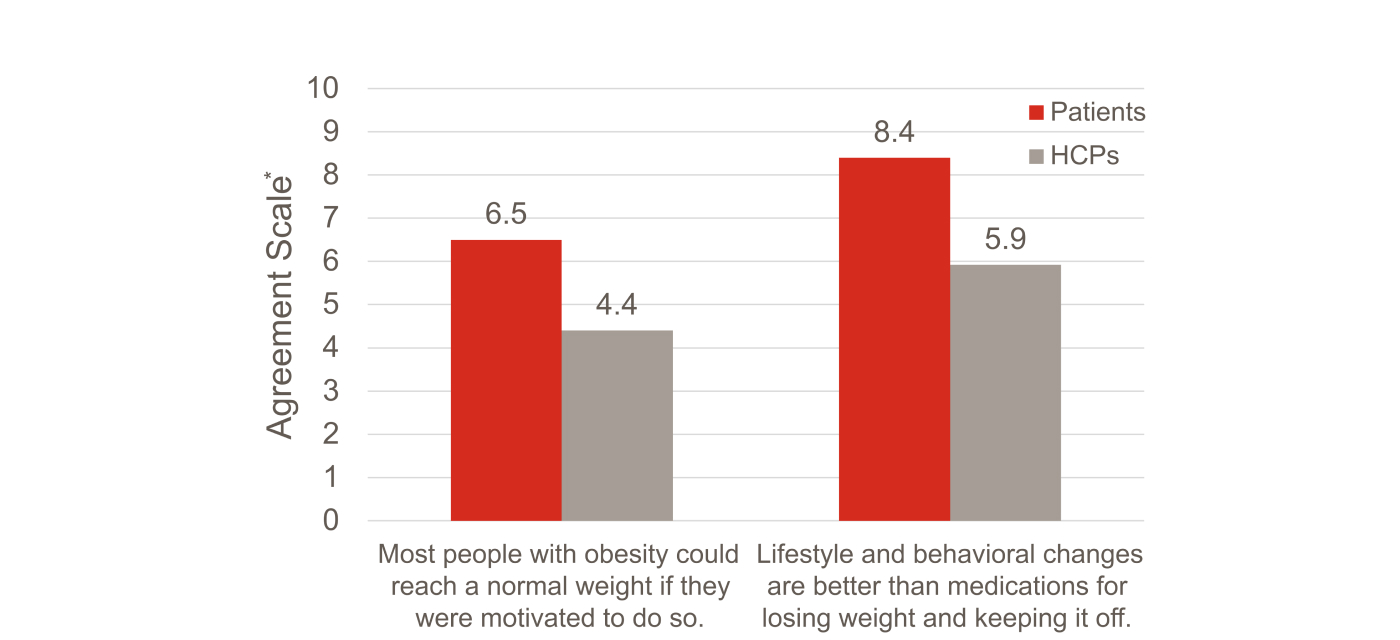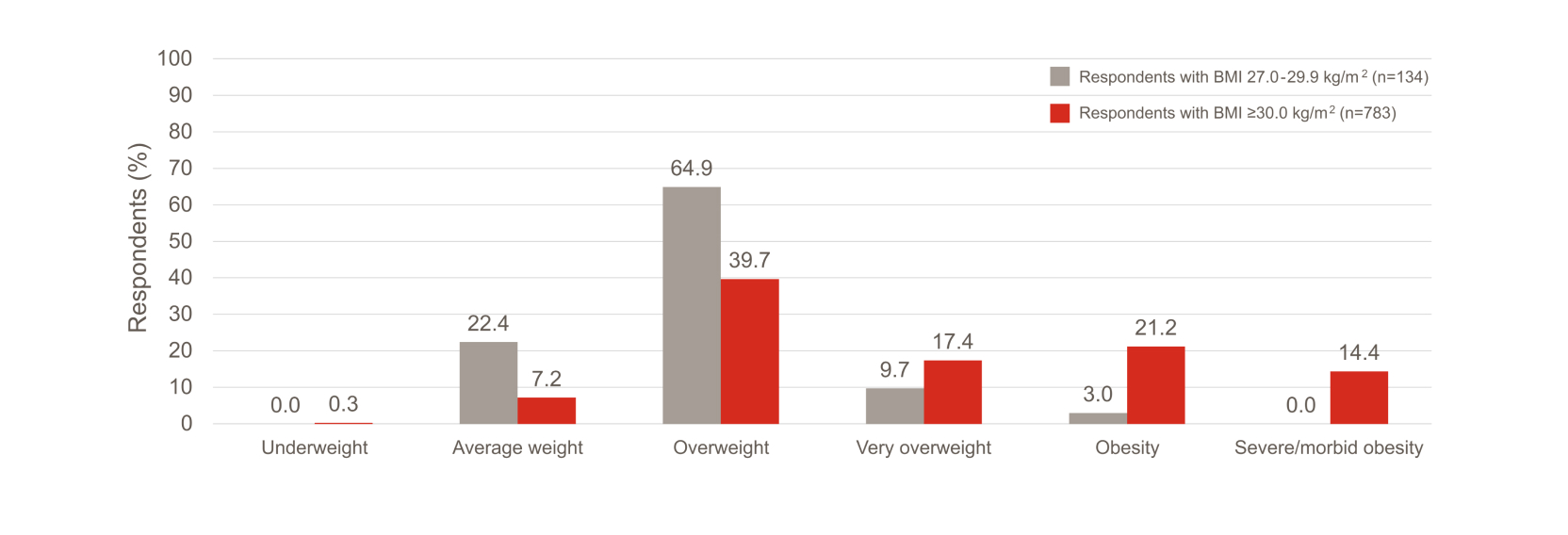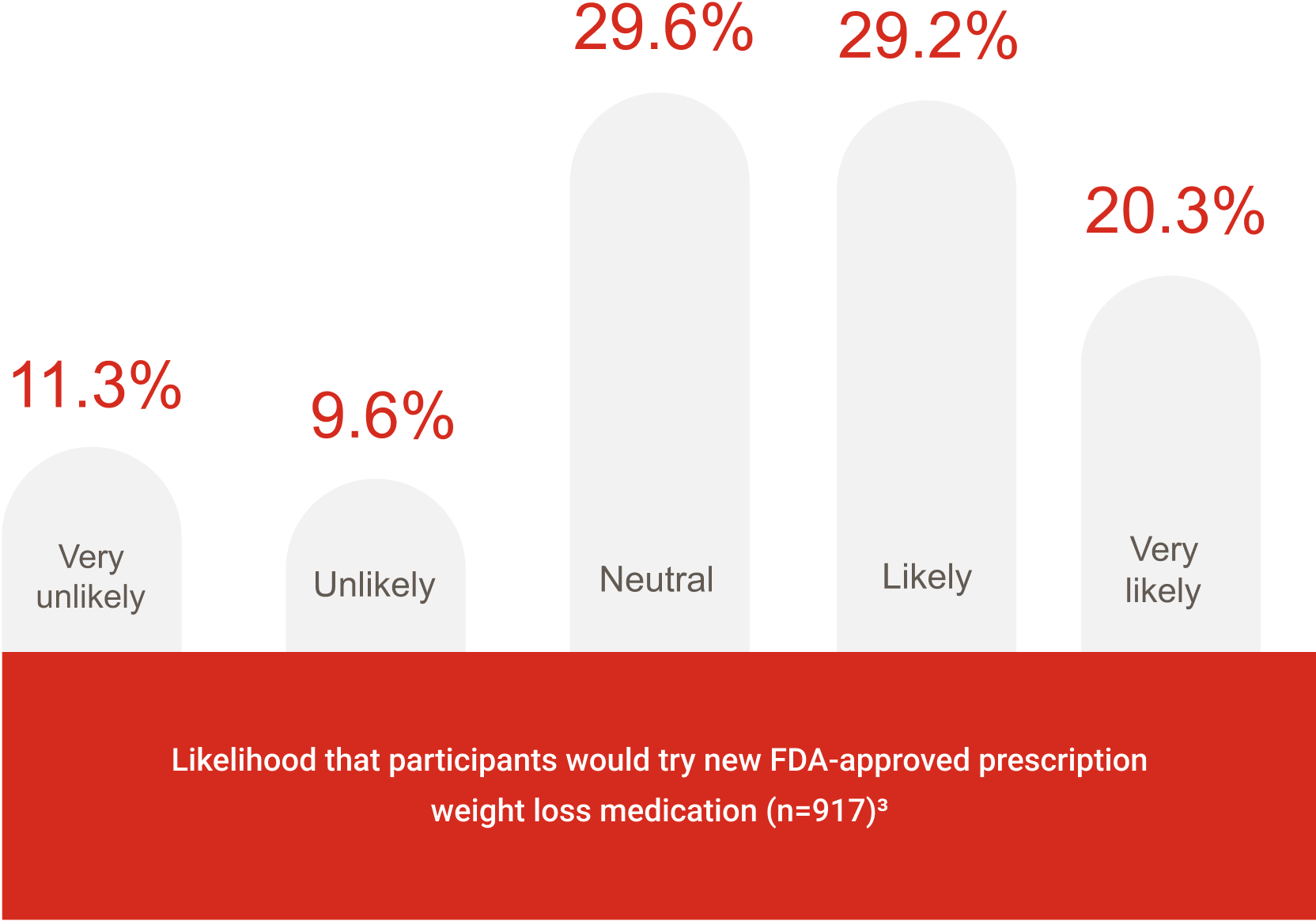OBSERVE
Patient Perspectives
OBSERVE is a study evaluating the attitudes of key stakeholders in the US about obesity and its effective therapy.
Qualitative Phone Interview Results: Patient Perspective1
Most patients surveyed (BMI 29-48 kg/m2) did not see themselves as having obesity and were upset to see the diagnosis documented in their charts. The most common self-descriptors used by respondents were:



Respondents did not trust BMI as a measure of obesity, feeling that it does not consider important factors, such as muscle mass and ethnicity.
HCP and Patient Perceptions Toward Obesity and Its Treatment: Obesity as a Self-Modifiable Condition

*Respondents ranked their level of agreement from “0: completely disagree” to “10: completely agree.”
- All 14 respondents who were asked said that they would be agreeable to and/or welcome an AOM therapy that included physician visits every 1-3 months
- Respondents preferred in-person physician interactions to telehealth interactions
Respondents felt that AOM adherence might increase if combined with:



Quantitative Web-Based Survey Results: Patient Perspective
Self-Reported Weight Categories2

Respondents were asked to rank their level of agreement or concern with statements referring to perceptions and treatment of obesity and AOMs.
When ranking agreement, the provided options were “strongly agree,” “agree,” “neutral,” “disagree,” and “strongly disagree.” For the following data:
- “Agree” includes those who selected “strongly agree” or “agree”
- “Disagree” includes those who selected “strongly disagree” or “disagree”
When ranking concern, the provided options were “very concerned,” “quite a bit concerned,” “moderately concerned,” “a little concerned,” and “not at all concerned.” For the following data:
- “Concerned” includes those who selected “very concerned” or “quite a bit concerned”
Perceptions of Obesity2
Over 80% of respondents agreed that obesity:
- Has a significant impact on long-term health
- Increases the chances of developing other health problems
- Has a significant impact on physical functioning
Over 50% of respondents agreed that obesity:
- Is a chronic (long-term) issue
- Is a disease
- Is a result of unhealthy and poor personal choices
Over 25% of the surveyed people with overweight or obesity disagreed with the following beliefs about obesity treatment2:
- Obesity often requires treatment with prescription medications to be effectively managed
- Over-the-counter medications and nonprescription supplements (eg, herbals, vitamins) are acceptable methods of treating obesity long-term
- Obesity is often best treated with bariatric surgery
70% or more of the surveyed people with overweight or obesity agreed with the following beliefs about obesity treatment2:
- Changes to the diet are needed to be successful in managing obesity
- Changes in physical activity are needed to be successful in managing obesity
- Lifestyle and behavioral changes are more effective for losing weight and keeping it off than all available medications


Among all respondents, the most common factors to change the likelihood of a respondent taking an AOM were3:

Perceptions of Long-Term AOM Use3

46.9% were receptive

17.3% were not receptive

35.8% reported that duration of use did not impact willingness to try an AOM


Among the 19.9% of respondents who had been previously treated with AOMs, the most common reasons for stopping AOM treatment were3:



Summary
The OBSERVE study determined that people with obesity view it as a self-modifiable condition.2 When treating obesity, lifestyle modifications were preferred compared to long-term medication.1,2 Respondents expressed concerns regarding cost and side effects of AOMs.3 However, approximately 50% of the respondents reported that they would be likely to try a new AOM.3 Please refer to the cited references for complete results.
For more information about the patient perspectives identified in the OBSERVE study, check out the video below.
References
- Ard JD, Kaplan LM, Dunn JP, et al. Pharmacotherapy use in obesity care: divergence among health care providers and persons with obesity. Poster presented at ObesityWeek; November 1, 2021; virtual meeting.
- Ard JD, Kaplan LM, Dunn JP, et al. Perceptions of persons with obesity or overweight toward this disease and its treatment. Poster presented at ObesityWeek; November 2, 2022; San Diego, CA. Poster 257.
- Kaplan LM, Kumar RB, Ahmad NN, et al. Experience and perceptions of anti-obesity medications among persons with obesity or overweight. Poster presented at ObesityWeek; November 2, 2022; San Diego, CA. Poster 156.
VV-MED-141930
Please rate your satisfaction with the content on the following statements:
Very Dissatisfied
Dissatisfied
Neutral
Satisfied
Very Satisfied